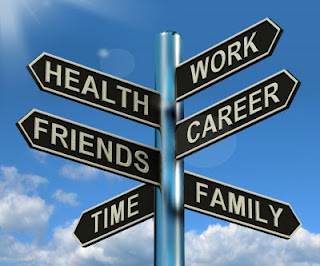- Get link
- X
- Other Apps
- Get link
- X
- Other Apps
Most of us are not satisfied with just working, we take care of our relationship, we meet family and friends, do hobbies and participate in clubs, go dancing on the weekend, to the theater, cinema, fine dining, and do sports.
If you think that a long-term trip automatically brings a good balance, and analyze the whole thing a bit, you will quickly realize that there are also some things to consider when traveling.
Our mind requires a certain amount of stimulation in order to feel fulfilled. This is where the work-life balance analyses that have been explored more deeply with the increasing burnout/boreout syndromes in our modern society help us.
Most self-drivers like their life, their job - and have purposefully worked towards making this journey possible for themselves. Few are likely to have thought about why they feel so good about their life and work. When life is fulfilling, such self-analysis is also rather optional.
People who have been confronted with a burnout/boreout personally or in their circle of friends, or who deal with the matter professionally, will deal with this. The graphic below visualizes a healthy work-life balance according to current findings quite clearly:
With a long-term trip, many of the rituals, the structures that have brought our work and private lives to a good balance are no longer necessary.
The experiences of previous vacations of up to 6 weeks that served to recover from work phases, unfortunately, do not bring much with regard to a long-term trip.
People who have been confronted with a burnout/boreout personally or in their circle of friends, or who deal with the matter professionally, will deal with this. The graphic below visualizes a healthy work-life balance according to current findings quite clearly:
With a long-term trip, many of the rituals, the structures that have brought our work and private lives to a good balance are no longer necessary.
The experiences of previous vacations of up to 6 weeks that served to recover from work phases, unfortunately, do not bring much with regard to a long-term trip.
Some of the travelers seem to instinctively find a good travel balance here, but every now and then you also read about boredom and crisis of meaning in the travel blogs and also on social media.
Boredom while traveling is perhaps also the wrong term. Travel boredom doesn't fit either. I call it travel fatigue, when you eventually become jaded due to the many new impressions and can no longer appreciate newer impressions equally.
Example: If you travel to southern Africa, you enthusiastically pull out your camera when you see the first elephant, but a few days later you are disturbed by the herd of elephants crossing the track.
When traveling, one should also pay attention to the speed of travel and plan "vacations". Phases without new impressions, in which one can regenerate.
Again, the number of personal interests and hobbies each enriching. Writing a diary while traveling, blogging, Instagram, professional photography, writing a book, filming the trip can also quickly consume free time while traveling and bring a certain workload and mental occupation.
Analogously, hobbies or clubs can, after all, spice up the workday back home.
Reading books, listening to audiobooks or podcasts are further spicing elements, regardless of whether one is currently working or traveling.
We humans are (mostly) social creatures, too. As in work phases, we should regularly interact with friends and family. When traveling, it is equally worthwhile to establish and maintain deeper contacts and friendships with other travelers.
Even really good friends can often not really understand the desire to travel and the travel life - and certain travel topics and tips can be better discussed with other travelers.
A world trip or long-term travel can also lead to a crisis of meaning, boredom or travel depression. What is the reason and how can we prevent this?
Boredom while traveling is perhaps also the wrong term. Travel boredom doesn't fit either. I call it travel fatigue, when you eventually become jaded due to the many new impressions and can no longer appreciate newer impressions equally.
Example: If you travel to southern Africa, you enthusiastically pull out your camera when you see the first elephant, but a few days later you are disturbed by the herd of elephants crossing the track.
When traveling, one should also pay attention to the speed of travel and plan "vacations". Phases without new impressions, in which one can regenerate.
Again, the number of personal interests and hobbies each enriching. Writing a diary while traveling, blogging, Instagram, professional photography, writing a book, filming the trip can also quickly consume free time while traveling and bring a certain workload and mental occupation.
Analogously, hobbies or clubs can, after all, spice up the workday back home.
Reading books, listening to audiobooks or podcasts are further spicing elements, regardless of whether one is currently working or traveling.
We humans are (mostly) social creatures, too. As in work phases, we should regularly interact with friends and family. When traveling, it is equally worthwhile to establish and maintain deeper contacts and friendships with other travelers.
Even really good friends can often not really understand the desire to travel and the travel life - and certain travel topics and tips can be better discussed with other travelers.
A world trip or long-term travel can also lead to a crisis of meaning, boredom or travel depression. What is the reason and how can we prevent this?
Conclusion
"Just traveling" is equally beneficial to mental health as "workoholic living" at home. A trip around the world is not an actual vacation. Daily planning, experiencing, rescheduling, cooking, doing the dishes, finding wild camping space, being attentive (more or less depending on the destination/region) - that's not a vacation!
You might think of it as the new "work." And just working can lead to burnout or boreout. A leisurely pace of travel and regular breaks of several days help to continue to enjoy new impressions.
Also on trips hobbies and activities should be cultivated which make one fun, from reading, audio books to photography, diary, a non-fiction writing to the filming of the trip - there is no limit to your creativity.
If you have done sports regularly, you should try to maintain this while traveling and think about a realistic implementation.
Social contacts are also important when traveling. Forced many of them are superficial because you have only a short time together. Here are travel partnerships where you exchange at least virtually regularly and maybe even meet now and then - a great enrichment.
And also the family and friends at home - we should contact regularly and exchange. Letting each other participate in each other's lives is incredibly enriching and inspiring, both for the people back home and for us on the road.
Some also find it enriching to work on a farm for two weeks on the road. If you can't organize this yourself on the road due to lack of language skills, you can find appropriate offers in portals for woofing. Usually it is 5 hours of work per day for room and board. The "hosts" are often emigrants which makes the language barrier a little easier. https://wwoofindependents.org/hosts/search
I hope I could give you some suggestions. Do you have any other tips for me or other readers? You can always leave an anonymous comment below.
Articles you might also be interested in:



Comments
Post a Comment